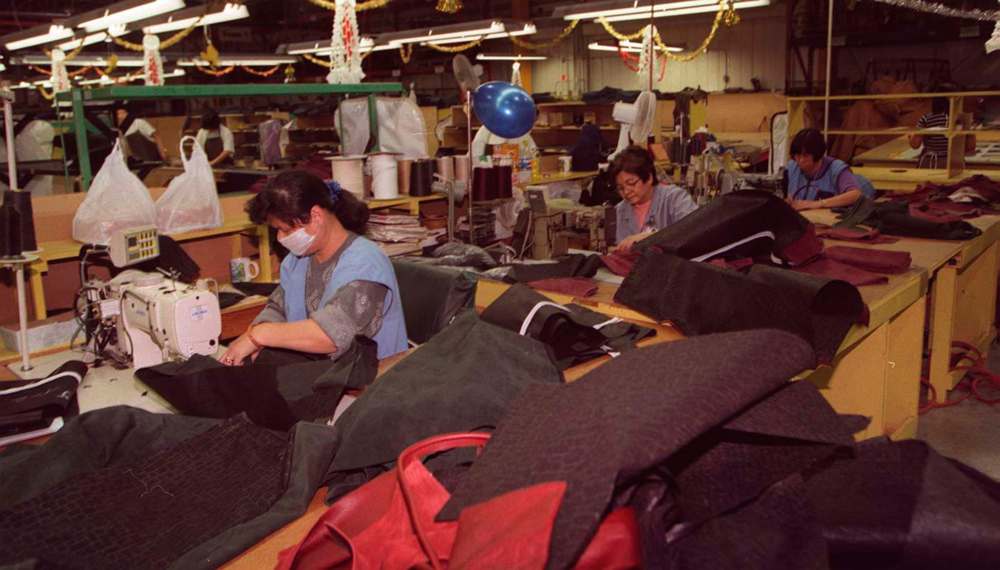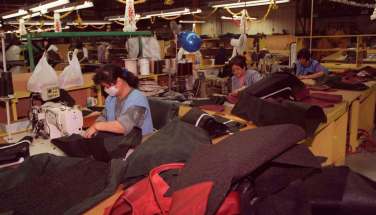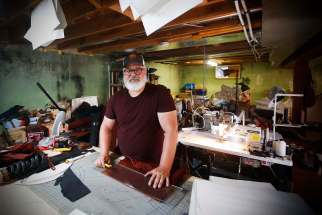Canadian manufacturers, Retail Council point fingers in foreign furniture tariff fight
Read this article for free:
or
Already have an account? Log in here »
To continue reading, please subscribe:
Monthly Digital Subscription
$0 for the first 4 weeks*
- Enjoy unlimited reading on winnipegfreepress.com
- Read the E-Edition, our digital replica newspaper
- Access News Break, our award-winning app
- Play interactive puzzles
*No charge for 4 weeks then price increases to the regular rate of $19.00 plus GST every four weeks. Offer available to new and qualified returning subscribers only. Cancel any time.
Monthly Digital Subscription
$4.75/week*
- Enjoy unlimited reading on winnipegfreepress.com
- Read the E-Edition, our digital replica newspaper
- Access News Break, our award-winning app
- Play interactive puzzles
*Billed as $19 plus GST every four weeks. Cancel any time.
To continue reading, please subscribe:
Add Free Press access to your Brandon Sun subscription for only an additional
$1 for the first 4 weeks*
*Your next subscription payment will increase by $1.00 and you will be charged $16.99 plus GST for four weeks. After four weeks, your payment will increase to $23.99 plus GST every four weeks.
Read unlimited articles for free today:
or
Already have an account? Log in here »
Hey there, time traveller!
This article was published 17/06/2021 (1635 days ago), so information in it may no longer be current.
A quarrel between Canada’s largest furniture manufacturers and the council representing a majority of the country’s retailers continues to intensify, with the ultimate decision in the hands of a federal tribunal.
Winnipeg-based producer Palliser Furniture, along with five other producers, initiated an investigation by the Canada Border Services Agency earlier this year into “dumping” practices by China and Vietnam. The group claimed those countries were exporting goods, such as upholstered sofas and recliners, to Canada at cheaper prices than in their home markets.
The probe swiftly led to a preliminary determination, whereby products from China are now subject to provisional duties as high as 296 per cent and items from Vietnam as high as 101 per cent.

These are tariffs the Retail Council of Canada is strongly fighting against, even opening up avenues for anonymous contributions from the general public to do so, before the foreign taxes are finalized by Ottawa-based Canadian International Trade Tribunal in August.
In exclusive interviews with the Free Press, executives from Palliser and the Retail Council did not mince words — pointing fingers at each other and quipping about where their loyalties lie.
“Our main goal here is to make sure there’s an even playing field that benefits Canadian producers and manufacturers, because we want people to have Canadian jobs and Canadian opportunities, and not these egregious, artificially-run practices,” said Peter Tielmann, president and chief executive officer of Palliser.
“Our main goal here is to make sure there’s an even playing field that benefits Canadian producers and manufacturers, because we want people to have Canadian jobs and Canadian opportunities.”
– Peter Tielmann, president and chief executive officer of Palliser
“Personally, I don’t have any clue about why the Retail Council is taking this kind of negative stance against that. Shouldn’t they be on the side of Canadian business?”
Tielmann accused the Retail Council of “inaccurately” and “inappropriately” putting up smaller furniture shops — such as Love Dodd in Victoria — at the forefront of the fight.
“They’re making it seem like those mom-and-pop places are the ones that are losing out on this situation. All the while, they’re using big-shot lawyers and taking cues from places like Leon’s and the Brick,” he said.

“And what other small furniture shops, apart from Love Dodd, have they asked the media to interview? I haven’t seen anyone else.”
Diane Brisebois, president and CEO of the Retail Council, said she couldn’t disagree more vehemently.
“It’s outrageous to me that Palliser even dare insinuate something like this,” she said Thursday, defending the organization that represents more than 45,000 retail establishments, accounting for more than 70 per cent of all sector sales in Canada.
“The reality is, simply the number of phone calls and letters we’ve gotten from family-run and independent retailers shows otherwise: these tariffs are not what retailers want and it’s also not something consumers will want either.”
“.. The timing couldn’t be worse. We’re smack dab in the middle of the pandemic, and this is what these manufacturers want to be doing to struggling retailers? Haven’t they suffered enough?”
– Diane Brisebois, president and CEO of the Retail Council
Manufacturers such as Palliser “have not been innovating enough or offering enough variety,” Brisebois said, adding that’s why some shops have been “forced” to turn to foreign outlets.
There have also been many delays in getting products delivered on time from Canadian producers, she added.
“More than that though, the timing couldn’t be worse. We’re smack dab in the middle of the pandemic, and this is what these manufacturers want to be doing to struggling retailers? Haven’t they suffered enough?”
Tielmann admitted “the timing isn’t great, but it’s the right thing to do.” In 2003, his company operated five furniture factories in Canada; today, it only has a single plant located in Winnipeg.

“Here’s the thing: the U.S. and other jurisdictions already have tariffs like this in place. And so the real issue is, if this doesn’t go ahead, I’m afraid we won’t be the only Canadian manufacturers that will be forced to leave this country because it’s just not viable to be here for our business,” he said.
Second Palliser plant planned
Negotiations are underway for Palliser Furniture to open a second Canadian plant, potentially next to its only current facility in the country, located in Winnipeg.
It’s a process that will need to be approved by the Manitoba government. Should things go ahead, it will add up to 400 new jobs and increase output capacity by 50 per cent, the company says.
Negotiations are underway for Palliser Furniture to open a second Canadian plant, potentially next to its only current facility in the country, located in Winnipeg.
It’s a process that will need to be approved by the Manitoba government. Should things go ahead, it will add up to 400 new jobs and increase output capacity by 50 per cent, the company says.
In a recent interview with the Free Press, president and chief executive officer Peter Tielmann hinted at details about the new facility. While he couldn’t comment precisely, given pending government approvals, he said Palliser might also be looking at Alberta as a potential candidate for its second plant.
Tielmann added “everything to do with the facility” also is “directly related to the tariffs” on exports from China and Vietnam for furniture.
“Of course, if the tariffs are finalized in August, then we’ll very aggressively expand to meet the demand in Canada,” he said. “And yes, that might also mean more than just the second facility — it could mean a lot more.”
Should Palliser expand in this fashion, furniture industry sources say other manufacturers — especially those with Canadian headquarters — will also likely start to increase their presence in the country.
— Temur Durrani
Dumping is also “just completely unsustainable,” Tielmann added, “because in the long run, once China and Vietnam have exhausted their artificial prices, they’ll revert back to higher costs. And by then, there won’t be any Canadian manufacturers left to turn to.”
It is a stance Brisebois “takes offence” to.
“We’ll have to wait and see what the final decision is. And yes, duties are there to be paid for a reason,” she said. “I just don’t think it’s accurate to assume that a product is being ‘dumped’ because it’s cheaper and so then, should have higher duties.
“Maybe Palliser and others should look to see why their product isn’t at a better price point. Right now, I don’t think there’s much of a quid pro quo going on, and so even if these tariffs go ahead, I’d like to see how savvy manufacturers are willing to become.”
The Canadian International Trade Tribunal said it will not comment on the situation while the process for a final decision is ongoing.
temur.durrani@freepress.mb.ca
Twitter: @temurdur








